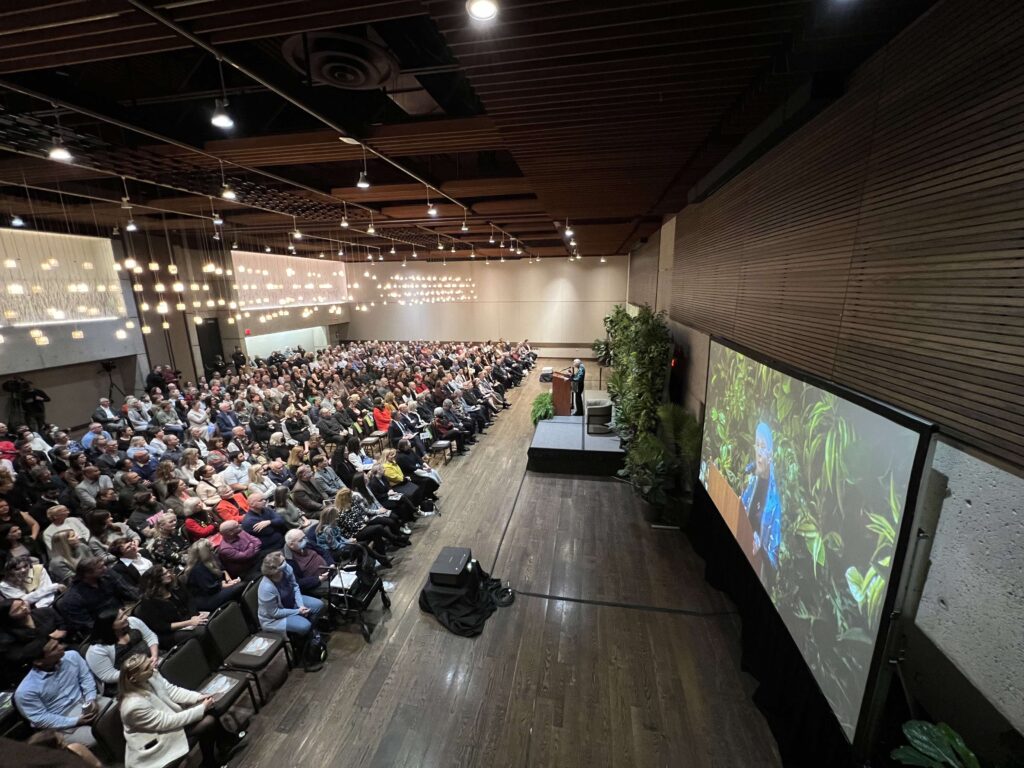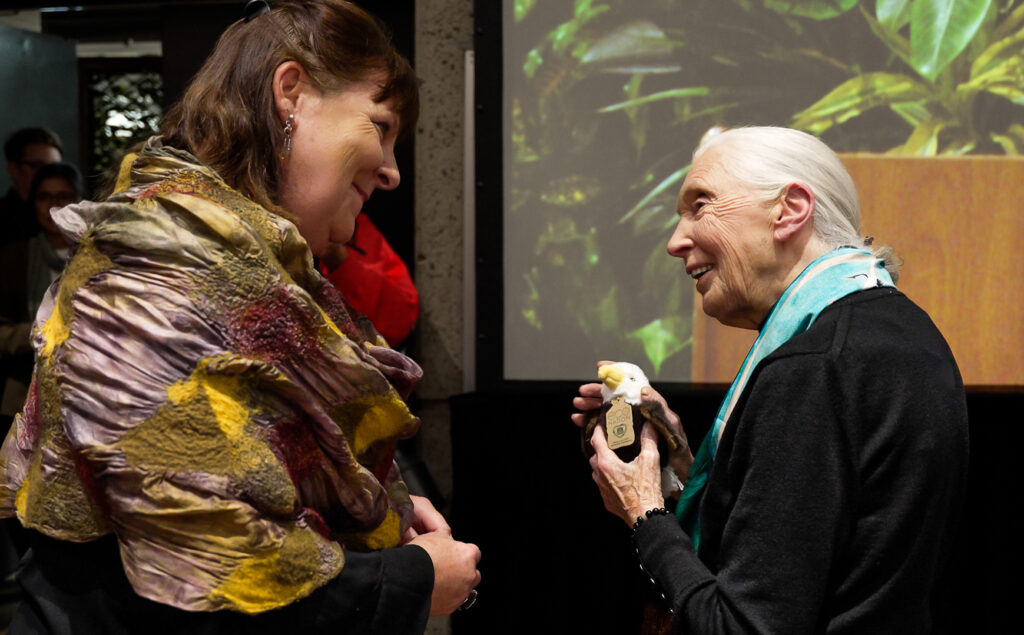Jane Goodall: Do we have the will to save the world?

Famed animal scientist and environmental activist delivers challenge to crowd at Royal Botanical Gardens.
There are many reasons to give up hope when the smartest species ever to roam Earth is poised to destroy it, says famed wildlife researcher Jane Goodall.
Yet she continues to hold on to the glimmer of hope that exists at the end of a long, dark tunnel humanity has entered. It shines as a tiny flickering light that humans must embrace, Goodall urged her audience – 400 lucky people who literally won a lottery to hear her speak.
The diminutive Goodall, who turns 90 next year, spoke without notes and with a number of stuffed animals on the podium that she used to talk about the intelligence of wildlife species.
Mr. H, an ape given to her 32 years ago by someone who thought it was a chimp, has travelled to 61 countries with her, she says.
Goodall was born in London, England and fled to her grandmother’s with her mother and sister when World War II broke out. She spent hours in trees, watching spiders and birds and reading books from the library.
One of those books was the Edgar Rice Burroughs classic Tarzan, Lord of the Jungle, published in 1927. She read it cover to cover.
“Tarzan married the wrong Jane,” she joked.
But from that was born her dream to go to Africa, study chimpanzees and write her own books.

Her mother always supported her ambition, even when it seemed impossible, says Goodall. When others were telling her she couldn’t afford to travel around the world or that Africa was a dangerous place, her mother told her she could only realize her dream through working hard, taking every opportunity given to her and not giving up.
She shared a story of her four-year-old self so intrigued by how eggs came out of hens that she snuck into a henhouse to watch. She waited four hours and her frantic mother was about to call the police when an excited Jane raced out to share her new knowledge.
Instead of chastising her, Goodall’s mother sat down to hear her story.
“That was the making of a little scientist who was asking questions …” said Goodall, who also spoke to hundreds of Grade 4 to 6 students as part of her RBG visit.
“I wish my mom was alive to know how many people have said to me, ‘Jane, thank you. Because you did it, I know I could do it, too.’”
But her path was far from traditional, if there is such a thing for a woman in science in the 1960s. Her family couldn’t afford university, so Goodall went to secretarial school. She was motivated, not by her studies, which were “terribly boring,” but by her mother’s wish that she give everything she had to everything she did.
Her audience listened raptly as Goodall shared the series of events that saw her become one of the great animal researchers in history.
It was Goodall’s science that pointed to the high intelligence of chimpanzees, their problem-solving capabilities and their capacity for emotional attachments and expression.
She spent months at a time deep in the forest of Gombe Stream National Park in Tanzania, observing the chimps’ behaviour, learning their personalities and earning their trust.
“What was so amazing was how much us they really are. They kiss, they embrace, they hold hands.”
Young chimps, long after they are independent, remain bonded to their mothers. She watched a young male adopt an orphaned chimp that he shared his food with, carried around and protected.
But Goodall also witnessed chimpanzees display other human traits – violence, territorialism and domination.
After two years of documenting her observations, Louis Leakey, a Kenyan archaeologist and palaeontologist who took Goodall under his wing, convinced her she needed to get an education in order to be taken seriously.
Though she hadn’t completed a day of university, he got her enrolled in a PhD program at Cambridge. When she shared her work with her professors, they told her she was way off. She shouldn’t be naming the chimps. Real science demanded they be known by numbers only, they said. And chimps weren’t capable of logic or emotions, those are uniquely human abilities, they said.
“My dogs had taught me otherwise. You can’t share your life in a meaningful with a dog without knowing we aren’t the only salient beings who have feelings.”
Goodall lovingly talked about all kinds of intelligent species – whales, dolphins, elephants, ions, crows, parrots, octopuses, rats and pigs, just to name a few.

Goodall says she thought she would spend her whole life in the forest as she helped to set up research stations around Africa. But when she learned about the plight of chimps in captivity and those subjected to medical research, she knew she had to shift her life’s work.
She forced herself to visit a medical lab and was haunted by what she saw. As tears ran down her face, one chimp reached out of his cage to comfort her. From there, she committed to ending medical testing on chimps, she helped to fight deforestation and the bush meat trade in Africa, she set up community-led conservation efforts and worked to improve health care and education for the people.
The Jane Goodall Institute is now in 70 countries.
“I get asked all the time, ‘Do you really have hope?’ I have to admit that it’s getting hard and harder,” she said.
“We are the most intellectual creatures ever on this planet and yet we are destroying our home.”
Humanity is at the mouth of a long, dark tunnel and there is a tiny glimmer of hope in the distance. That hope only gets closer if we reverse climate change, end factory farming and the use of toxic chemicals that are killing soils and water, and find a way to live in peace and without hate.
“Yes, we can save the world. We have the tools but do we have the will? The window is closing. We must do this before it’s too late. The human species is not exempt from extinction.”






